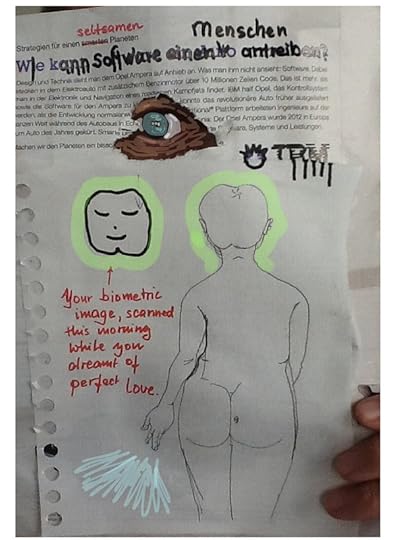Marcus Speh's Blog, page 6
August 25, 2012
humanity
After many years of war, Men and Giants finally reached an agreement: the Giants would stay in the cities, and the Men would withdraw to the countryside. Because of the bloodshed, neither race wished to see much of the other. The Giants never wanted to lay eyes upon Men, and the Men simply forgot about the Giants. Everyone had better things to do and the conflict that had occupied the world for so long became a lost memory. Many generations passed as quickly as eyelashes grow. — One day, a Giant-child accidentally opened a door in the wall that protected the city from the outside. The child stepped through the door and looked out. It screamed, quickly ran back and slammed the door shut. What did you see? said the friends of the child, is the countryside crawling with little creatures? No, said the child, not at all. They’re all giants, they’ve become enormous. At the same time, a Man-child found the door to a city, and went through it to look at the Giants. The child came back looking disappointed. What is it? said its friends, didn’t you find the Giants scary? No, said the child, not at all. There are no Giants, they’ve shrunk to our size. And this was the beginning of humanity everywhere.
Photo: Wikimedia. The Molecule Men, giant statue by Jonathan Borofsky in front of the Osthafen of Berlin, Germany, served as prompt for this story.

summer feet
 A great advantage of having lived a for few summers already is that you can imagine August heat even if there is no heat in August. Another wondrous accompaniment of summer is the appearance of human feet. As every year, I notice how much more vulnerable feet look than the rest of their owners. Much more than hands, which are often used to fend off, hide, manipulate, and so on. Hands, for most people, are tools with their own role in building and maintaining a persona. By comparison, feet are innocent by–standers. In northern countries, they are hidden most of the year; feet are busy are fighting fungi and maintaining their straight shape against the fierce interest of fashion, or poverty, or neglect. I spend a fair amount of traveling time on the tube and on the street looking at feet. From my observations I deduce pains, passions, and predilections of the person attached to a pair of feet. Some I’ve heard place more trust in the reading of butts, but people are more peculiar about their butt than about their hooves. Some of the feet I encounter I’d like to shake as if they were hands, like saying welcome. Others make me feel sad, and I don’t even know why. I’m not even going to start with toenail polish here. Whoever said that I eyes are the window of the soul, evidently paid no heed to the heels. Enjoy the basement views.
A great advantage of having lived a for few summers already is that you can imagine August heat even if there is no heat in August. Another wondrous accompaniment of summer is the appearance of human feet. As every year, I notice how much more vulnerable feet look than the rest of their owners. Much more than hands, which are often used to fend off, hide, manipulate, and so on. Hands, for most people, are tools with their own role in building and maintaining a persona. By comparison, feet are innocent by–standers. In northern countries, they are hidden most of the year; feet are busy are fighting fungi and maintaining their straight shape against the fierce interest of fashion, or poverty, or neglect. I spend a fair amount of traveling time on the tube and on the street looking at feet. From my observations I deduce pains, passions, and predilections of the person attached to a pair of feet. Some I’ve heard place more trust in the reading of butts, but people are more peculiar about their butt than about their hooves. Some of the feet I encounter I’d like to shake as if they were hands, like saying welcome. Others make me feel sad, and I don’t even know why. I’m not even going to start with toenail polish here. Whoever said that I eyes are the window of the soul, evidently paid no heed to the heels. Enjoy the basement views.
First posted at 100 days of summer. Photo: “lily feet” of a high caste Chinese lady, 1911.

August 23, 2012
The Humbling
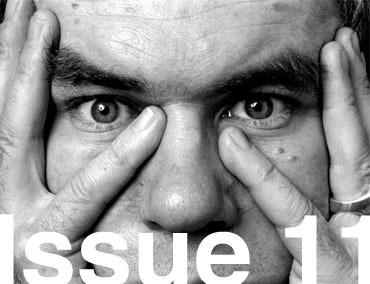
Now you see me. Now you don’t. Now you see me. Now you don’t …
When the (then still) mysterious literary online magazine > kill author asked me in 2011 to write a guest introduction to their issue eleven named after Raymond Carver, I began my work by ordering a celebrated Carver biography praised by Stephen King (!) and reading all the Carver stories I could get hold off. That wasn’t the smartest way to start…I do know that too much research too early in the day can silence the birdie.
Interestingly, I had not thought of myself as a Carver fan but I became one in the process – even though the obsession with detail in Sklenicka‘s biography did eventuall put me off as much as the details of Thomas Mann’s digestion in his diaries full of suppressed anal eroticism bored me stiff when I tried to read them years ago (never mind the comparison, which concerns form not content). Carver is such an « American» writer. I was amazed that I liked him so much even though his background and his subject matter were so different from my own. What I especially enjoyed was his sense for the absurd, which I had never noticed before and which was going to become my point of entry for the editorial. Mental note: must watch “Short Cuts” again, made by Altman, another master of modernity.
Back to my editorial journey: first I had to embark on a painful, prolonged example of writerly procrastination — right until I received the pieces that were going to be in the magazine. It still took a while for me to stop sitting on my hands: a bit of a blur now but I think reading a fair amount of Beckett (“Watt”) and Camus (“Exile and the Kingdom“, a sculpted account of the absurd without the hopelessness) helped. Not surprisingly, my first couple of drafts of the editorial were pure philosophy, artfully abstract, and dry as a fir-wood coffin. Absurdly unreadable.
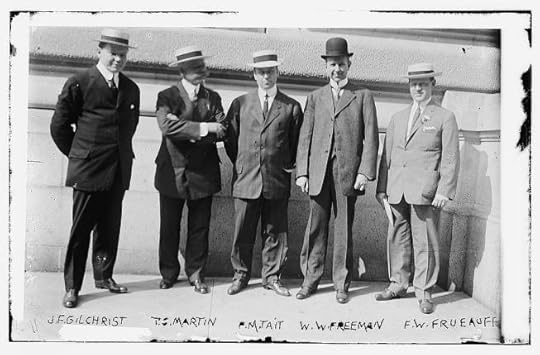
The five mysterious editors of > kill author (multiple personalities of Vaughan Simons)
I soon realized what my problem was: I was abusing the editorial as a mirror for my own ideas. I had unconsciously thought of it as an essay à la Speh with a reference to the work of the authors of issue eleven. Perhaps this is trivial to anyone but me — I had to turn the whole thing around to achieve anything worth doing at all, look away from myself and at the work of the others! So I dug in – and if you even have half the fun I had reading these texts, you’re in for a lot of fun. Somehow, the only way I could find to express my appreciation for both the whole issue and the individual writers was using collage as a technique & trust my own process & intuition. Which is why the guest editorial is what it is now: a riotous riff on 25 authors and their 42 pieces, a collage with a coda, a short closing bow from me.

Hanna Höch, Photomontage (U Chicago)
The result is an odd mixture between fiction and non-fiction, a dada collage – think Hanna Höch or John Heartfield with a poetic instead of a political bite. I can’t quite classify it myself but I do like this piece quite a bit and I do hope that the authors in that issue, whose work I greatly respect, do not feel shortchanged either…both the intro and the issue are another proof of > kill author‘s ability to innovate and inspire.
This was an important humbling experience for me that I’m happy to share with you here. And now hurry over there, give yourself a treat and don’t kill any authors along your way.
Postscript: Part of this post was written in 2011 when kill author’s issue 11 came out. I felt then like holding off on posting this, because frankly I felt that I was asking for too much attention at the time. I was never really comfortable with the editor’s chair. Still, there might be some valuable observations about process in here, and I still like the meta-fictional text I ended up writing for the magazine. In the meantime, kill author has ceased publication. Read my recent tribute to its editor, Vaughan Simons.

halfway
You may have noticed that I’ve been busy blogging since end of June as part of a 100 day project. Yesterday, Dorothee Lang suggested a few questions to reflect upon the process and the result at the 50/100 mark, and I’m only too glad to accept the challenge, since the height of summer finds me in a reflective mood much like one of the confused sexy young men in a Tennessee Williams play:
[image error]1. From your own work so far, which day is your personal favorite? — My favorite is “Marlowe and me”. This post is blood colored and it is built upon my recent rereading of Raymond Chandler’s The Big Sleep, the first of a series of novels with private detective Philip Marlowe. I became interested in the book again, because I’m currently conceiving of a detective story, and this was part of the birthing process. But I also favor this post, because it reminded me of my much younger self and made me conscious (in a good way) of how far I’ve come in my life path. And existential insights always are my favorite pastime.
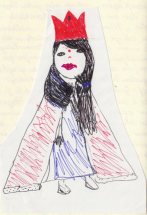 2. What approach/concept for the 100 days did you have at the start? Did it change, and if so, how? — I participated in the 100 day project 2011 for the first time, and without my planning it, the posts turned into a flash novel (which will be published next year). This year, I am at a very different point of my development as a writer: I have signed two publishing contracts and my inner magnets are constantly being rearranged so that I often feel disoriented (though electrically charged, too). It seems as if I had a lot more certainty last year (but less power, too). The reason is, I suppose, that I’m in transition to another level, both in my he/art and with regard to the reception of my he/art.… This is a long prologue to a short statement: when I began with the hundred day project this year, I only wanted to warm up for my habitual summer writing (a schedule which is somewhat enforced by my being a lecturer) and draw a crowd to my new book. However, I have once again written several original stories, a few reviews, drawings and collages (always great fun and a relief from writing), and a great number of posts about writing, grounding and growing. Since my time is running out before teaching begins again, there’s a chance I won’t reach the end of the project at this posting frequency, but so far I’ve kept up. Also, initially I played my music not on one, but on four different instruments/blogs, which proved too impractical, so for the rest of the project I’m focusing on my main blog.
2. What approach/concept for the 100 days did you have at the start? Did it change, and if so, how? — I participated in the 100 day project 2011 for the first time, and without my planning it, the posts turned into a flash novel (which will be published next year). This year, I am at a very different point of my development as a writer: I have signed two publishing contracts and my inner magnets are constantly being rearranged so that I often feel disoriented (though electrically charged, too). It seems as if I had a lot more certainty last year (but less power, too). The reason is, I suppose, that I’m in transition to another level, both in my he/art and with regard to the reception of my he/art.… This is a long prologue to a short statement: when I began with the hundred day project this year, I only wanted to warm up for my habitual summer writing (a schedule which is somewhat enforced by my being a lecturer) and draw a crowd to my new book. However, I have once again written several original stories, a few reviews, drawings and collages (always great fun and a relief from writing), and a great number of posts about writing, grounding and growing. Since my time is running out before teaching begins again, there’s a chance I won’t reach the end of the project at this posting frequency, but so far I’ve kept up. Also, initially I played my music not on one, but on four different instruments/blogs, which proved too impractical, so for the rest of the project I’m focusing on my main blog.
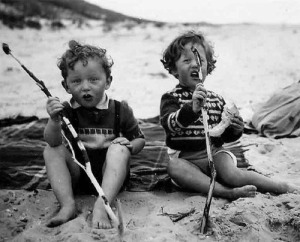 3. How do you feel about the hundred days of summer so far? — I feel great about it even though I am not sure that I will reach the end of the project at this posting frequency: time is running out before teaching will begin again and I feel a writing rumble in my guts which I need to obey. I feel a little sad that I didn’t get to relate to any of the other postings directly: indirectly however, reading other people’s stories and poems or looking at art and photos does inform my own work in ways that are probably unconscious but that’s actually just right for me. I wish I had more time to comment: Facebook is an o.k. substitute, but it’s a little distanced in a world that’s already defined by distance. Going to your blog directly is more like showing up in front of your door. I prefer it, and I prefer if people leave comments on my blog.
3. How do you feel about the hundred days of summer so far? — I feel great about it even though I am not sure that I will reach the end of the project at this posting frequency: time is running out before teaching will begin again and I feel a writing rumble in my guts which I need to obey. I feel a little sad that I didn’t get to relate to any of the other postings directly: indirectly however, reading other people’s stories and poems or looking at art and photos does inform my own work in ways that are probably unconscious but that’s actually just right for me. I wish I had more time to comment: Facebook is an o.k. substitute, but it’s a little distanced in a world that’s already defined by distance. Going to your blog directly is more like showing up in front of your door. I prefer it, and I prefer if people leave comments on my blog.
I’m very glad I’m part of this once again and I relish the fine creative company!

August 22, 2012
Finding Sera Marshall
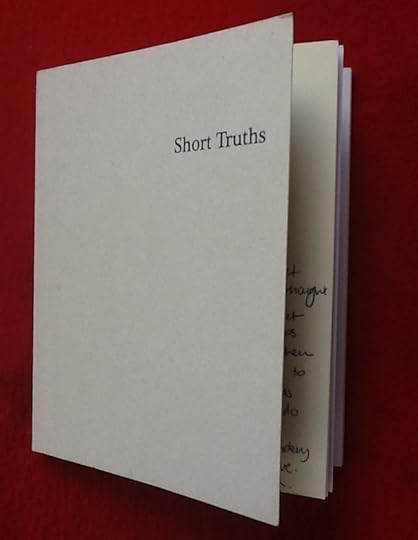
Autographed.
Met young British Turkish writer Sera Marshall in the Café Liebling in Berlin. According to her blog, Sera is ‘pretty and blunt’ (she is) and she has published a book titled “Short Truths”, a beautiful little thing full of moments of mundane absurdity:
«The last time he flew over from America cabin pressure could not be maintained. All the way from Philadelphia to London people were popping. Ear bleeds, nose bleeds. Aggressive first-class air stewards trying to assist with waxy, snotty, bloody tissues.»
I had a bitter lemon, Sera had an espresso, and her friend, an Italian Turkish (Turkish Italian?) film student, had a cappuccino. Later, Sera ate something with small shapely hands. The sun was burning, it was a little unreal sitting there with the two women. Her friend didn’t take her sun glasses off and I was wondering if she had any eyes. I was breathing through a straw and looking at the little book thinking that I didn’t even have a little book to offer as a gift. All I had were stories and opinions that I seem to have told so many times that I could taste the mould on my tongue as the morsels rolled out of my mouth and fell to the ground, while almost everything that the two women said appeared as fresh and new as the sensual observations that fill the book “Short Truths”:
«Close but not too close. Just like how I had put my arm in his. Three hands dug deep into pockets for warmth. One hand out, cold.»
Searching for Sera Marshall in that little book you will indeed find her that’s why it’s a good book.
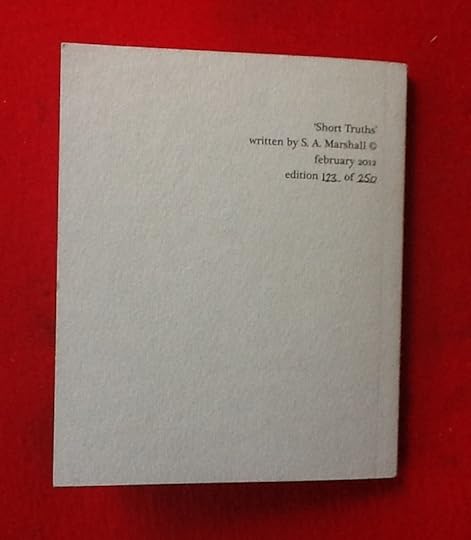
Numbered.
Later in the afternoon, I continued weaving my own Long Truth: looking at a new interview with me (no 14), a paper for a conference, a proposal for a fellowship allowing me to spend more time making things up. Online banter in between, and when the sun set, I put my legs up and finished The Big Sleep for the umpteenth time, coiling myself around an invisible cigarette. In L.A. that night, all guys were ageless, all concerns were dirty rackets, all truths were short and precise, down to the last drop of blood. In the little book I read: «He hit himself in the eye.» Marlowe could’ve said that. He couldn’t have said this though:
«On the 9:40 to Karaköy. Two slate grey dorsel fins, almost synchronised, broke the pale green of the Bosporus and with (what I assume was) a sharp, deep intake of breath retreated back into the depths of the water.»
“You talk too damn much, Marlowe,” I said to myself.
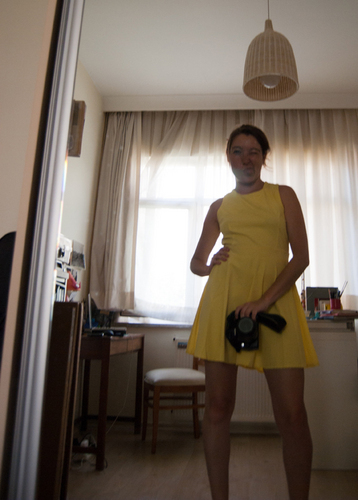 Quotes from: “Short Truths”, written by S A Marshall, February 2012, available from: A.Gallery, Glasgow. Sera Marshall is on Twitter and on Tumblr. Posted at ReviewForward, “a new online initiative for indie authors, for self published authors and for book bloggers.” Photo: Sera Marshall.
Quotes from: “Short Truths”, written by S A Marshall, February 2012, available from: A.Gallery, Glasgow. Sera Marshall is on Twitter and on Tumblr. Posted at ReviewForward, “a new online initiative for indie authors, for self published authors and for book bloggers.” Photo: Sera Marshall.

August 21, 2012
un roseau pensant
Everywhere nature is now growing so rapidly that it gets harder and harder to squeeze it in a parable. It meanders from the poetic out into a world beyond words in which there’s no speaking and writing but only sweating. Water and wine flow freely here. Nymphs coil themselves around the muscular arms and legs of men; fauns, their faces friendly grimacing masks. Put their hairy hands that move swiftly like small serpents on the buttocks and boobs of women. This is where games are played: the players are thirsty for victory or defeat. Both will be deeply felt: the winners attach themselves to their earnings like sinking divers to their respirators; the losers whine, howl and gnash their terrible teeth, threatening to bite, to pull blood. But somewhere else the next game is starting already and the players drift there like moist, breathing wood. What once appeared to the philosopher as a thinking reed has dissolved nicely into a soup of primal instincts. Playing and joking, we try to forget the descent. We dance and make music into a long summer night. Kiss me, because I’m Irish says a tee-shirt seen on TV. After the games is before the games.
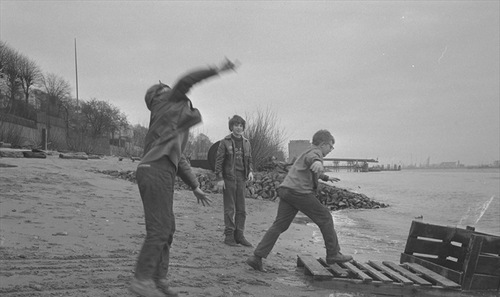
[First posted at: 100 Days Of Summer][Deutsche Version][Photo: children playing on the shore of the river Elbe near Hamburg, 1952.]

August 20, 2012
I can’t go on, I’ll go on
[image error]Met a few old writer friends for pasta, beer and ice cream. I notice how I’m relentlessly trying to stir the discussion away from trivialities and towards writing: technique, process, books, samples, stories of writerly failures and successes. On the way I read how self-devalorizing Beckett was, apparently unconscious of his own place in the canon. As if he was trying to evade or ignore the building of momentum that would eventually lead to his canonization. He didn’t get much recognition before his fifties. And when it came, it paralyzed him almost entirely. Success for some writers is like when a virgin falls among vampires. Says Beckett:
“I can’t go on, I’ll go on”
I like this mantra. I fear this mantra. (from: The Unnamable, 1954).
The new book of poetry by G. just came out over here. G. whom I know personally became famous at a young age and has struggled with that ever since it seems. Whatever he does cannot live up to the critics’ sharp, inflated expectations of his work, which is expected to become an ‘oeuvre’, a collective that surpasses and smothers its creator. If G. wanted to go back to his earlier, carefree state as a poetic libertine, he’d have to adopt a pseudonym. I don’t care for any of this work myself, inside or outside of the oeuvre: it seems labored and forcibly erudite—in fact, I’ve written pieces like that and I have forgiven myself for them on behalf of my inner insecure learner self—but I don’t value them highly.
Rarely relaxed: Beckett Blue-Eyes
Coming back to the party: I realized what the answer to my last horoscopechallenge is:“What is the longest-running lie in your life?”
My longest-running lie (I like the expression: it suggests a lot of stamina, the despair and glory of marathon) is:
“When I relax, terrible things will happen.”
This credo, alas, kept me going like Beckett, face grimly set in the clay of creativity. It is the cornerstone of my workaholism and my successes, or is it? I do believe it’s a lie, an uncomfortable, painful one, but those are, paradoxically, often the strongest ones. Compare (not mine): “I’m no good and I never will be.” – “I’m never going to find love.” – [please add your own favorite lie] — all of these are self-fulfilling prophecies, of course: believing them manifests their reality. As for my own web of lies, I’ve no clue how to go about it yet.
Any ideas how to truly relax after a lifetime of doing the opposite?
What is YOUR longest-running lie?
About the book “I can’t go on. I’ll go on.–A Samuel Beckett a reader”: I own this book in addition to individual editions of most of the excerpts contained in it. However, I often find myself going here: partly because of the excellent introductions written by someone who knew Beckett, published him, and obviously feels his work from the inside rather than the glib scholastic outside. These days, I use Beckett like a drug, to get me through holes of motivation and doubts of ability: I use Gertrude Stein in a similar fashion. There’s just something about clarity and truth of expression in Beckett’s work that helps me to realign my inner writing magnets. The horoscope line was taken from Robert Breszny’s Free Will Astrology site.

August 18, 2012
A Titan’s Course
The giant Utgarthilocus, chained in the cave.
Beginning the day with the usual mixture of non-doing and flagellating myself silently and subtly for doing so: this is my circular path at the moment. Henry James comes to my mind:“Try to be one of the people on whom nothing is lost!”
I really am trying to be one of those people. Next to my desk hangs a drawing by my daughter. It looks like a treasure map: there’s a path indicated by a dashed line, starting at the drawing of a temple like building (“Start in Hawii”). Somewhere along the way there’s a large key visible: confusingly, it’s turned upside down as if it was a key for a reverse door in outer space. This reminds me along this particular stream of consciousness of my penchant for androids and robots, and of my wife’s remark the other day I might consider introducing these artificial ones to death as the necessary price for humanity. Lately, I love this word: “humanity”. When spoken (and remember, I’m now speaking all my texts first), it feels like a breath of old air into a new, enormous room. 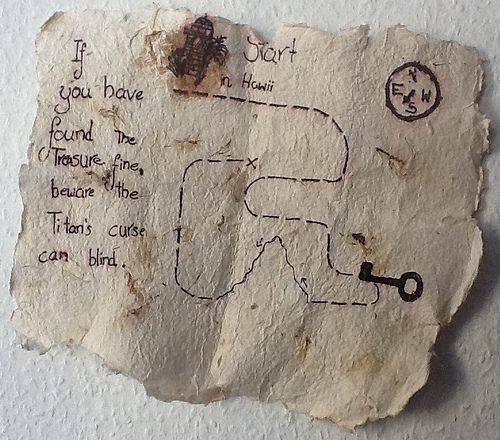 (There’s another novel I’d still like to read: E E Cummings’ The Enormous Room.) Back to the treasure map: besides a wind rose in the upper right corner that points towards south southeast (why? What’s there? Spain? Greece? Brobdingnag? Balnibarbi? Unfortunately East and West are reversed in the compass image so that it’s not clear), the most prominent part of the map is the sentence:
(There’s another novel I’d still like to read: E E Cummings’ The Enormous Room.) Back to the treasure map: besides a wind rose in the upper right corner that points towards south southeast (why? What’s there? Spain? Greece? Brobdingnag? Balnibarbi? Unfortunately East and West are reversed in the compass image so that it’s not clear), the most prominent part of the map is the sentence:
“If you have found the treasure fine, beware the Titan’s curse can blind.”
My daughter must have been impressed by the Titan’s Curse after reading the Percy Jackson YA novel of the same title (I haven’t read it). The idea of having a treasure map at all appeals to me. As does the idea that the treasure is not something one should find, but rather a driver, a prodding device that would lose all its power if it would be found. The idea that the treasure itself is cursed and will blind you, is a gruesome bonus, quite typical for the original Greek mythology as for our fairy tales: only the double negative will do to intensify negation. Think Chaucer:
“He nevere yet no vileynye ne sayde
In all his lyf unto no maner wight”.
(“He never yet no vileness didn’t say / In all his life to no manner of man”)
Well aligned, my horoscope, brewed by Breszny suggests that I should get back to Gisela, to the historical heroine that occupied me splendidly all of last summer:
«I am getting a psychic impression that you will soon be drawing on the energy of one of your past lives.»
I had never seen it that way, but it does make sense: if I actually was Giselle, this would explain my obsession with her across the abyss of 1000 years. And now I’m off to Hawii. I’m getting a psychic impression that this is where I should start my Titan’s course.
Gisela of Bavaria was a princess around the year 1000, who, only 10 years old, married the first King of Hungary, Stephen, and together with him christianized large parts of Eastern Europe. She is the protagonist of my flash novel “Gizella”, which will be published by Folded Word Press in 2013. Some of the early versions of flashes for this book are online.

i miss my plattenbau
 In a dream I was walking back from someplace where I did not want to be, when I suddenly found myself in the entrance hall of the Shell Centre building in London. People were bringing their lunches from somewhere and sat down on wooden benches around me. I recognize some, who I hadn’t seen in a long time. One man in particular, he was little and wore glasses, touched me. I hugged him and we both cried tears because we were so happy to see each other again. But despite the friendliness I felt like a stranger and I was getting hungry. I followed a group of workers to a nearby pub where evidently the food was prepared. First I had to queue for a drink for a really long time. Then I came to another restaurant which smelled like fish and chips, which is what I wanted. A group of young people moved a little ahead of me and I was afraid that they would cut in before me. But strangely enough, only one of them did and ended up in front of me, the others filed in behind me.
In a dream I was walking back from someplace where I did not want to be, when I suddenly found myself in the entrance hall of the Shell Centre building in London. People were bringing their lunches from somewhere and sat down on wooden benches around me. I recognize some, who I hadn’t seen in a long time. One man in particular, he was little and wore glasses, touched me. I hugged him and we both cried tears because we were so happy to see each other again. But despite the friendliness I felt like a stranger and I was getting hungry. I followed a group of workers to a nearby pub where evidently the food was prepared. First I had to queue for a drink for a really long time. Then I came to another restaurant which smelled like fish and chips, which is what I wanted. A group of young people moved a little ahead of me and I was afraid that they would cut in before me. But strangely enough, only one of them did and ended up in front of me, the others filed in behind me.
This reminds me of the situation yesterday in front of a cash machine where three teenagers were hogging, or so it seemed to me, access to the machine while charging their prepaids and exchanging life stories, looking over their shoulder at me furtively at times, whereupon I put a severe expression on my face, almost instinctive reaction to the bustle of youths. But being in the presence of business people produces the same effect: I’m no longer myself, I don’t see people for what they are, I’m more concerned about my place in the queue, as if I’m suddenly dominated by food envy. Do you know what I mean? As if my reflection in the other had redrawn the outline of my personality. I can’t remember the precise end of the dream.
Image: street art by El Bocho, Kollwitzstraße, Berlin. The German word “Plattenbau” means a building made of prefabricated concrete slabs. It stands for a whole world of industrial aesthetics which is now commonly identified with Eastern bloc socio-economics. ”Plattenbau” is also the new name of my Tumblr blog formerly called “1000 ship wrecked Penguins”. Tumblr is a vibrant, young blogosphere based on exchange of cool media. Tumblr is also the home of Alt Lit Gossip and my readers of the next thirty years…

August 17, 2012
Surveillance Surprise
Your biometric image, scanned this morning while you dreamt of perfect love
Alternative titles for this post were: “You’ve Been Recognized, Sucker” and “You’ve been identified, idiot!” — this seemed too harsh in the end. There’s that eye AGAIN! Pencil, my eye, glue, iPad, stencil, modified advertisement, red and black felt pen – © 2012 Marcus Speh; read more at rsn, “The New Totalitarianism of Surveillance Technology“, by Naomi Wolf; the modified German text above means: “strategies for a smart awkward planet” and “how can software fuel a car man”. Thanks Bruce, for sharing the article!



